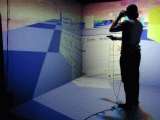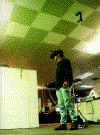




|
The Equator Experience Projects |
- Adaptive information in the physical city:
This project will develop and evaluate applications to enhance wayfinding within a physical city, exploiting a combination of wearable displays and adaptive public signposts. These will be deployed within the city of Lancaster using the 'Wired Lancaster' infrastructure and will be evaluated through use by the general public.
- Extending the digital city:
This project will enhance 'Virtual London', a large 3D model of London implemented in a collaborative virtual environment that is available at UCL, with live information from the physical world. Evaluations of this enhanced model will focus on whether the general public can effectively rehearse travel in advance and find out about conditions in the real London.
- Linking artefacts to electronic collections:
This project will develop a combined physical and digital environment to access documents and collections. Evaluations of this environment will focus on how physical objects can be effectively linked to their virtual equivalents and how digital information can be displayed as part of a physical museum and physical artefacts can be made available within a virtual museum. - Digital toys and collaborative playgrounds:
This project will focus on how to enhance play and learning for young children through new forms of digital toy that link physical toys to virtual environments. This will involve embedding computing functionality within physical toys in order to increase their interactivity and expressive potential, and then situating these within room sized environments where groups of children could use them to interact with virtual worlds as part of play and learning. Evaluation will involve the technologies being used by children in schools in Sussex and Nottingham (extending our on-going collaborations).
- Performing and participating in physical and digital stories:
This project will explore how performers and the public can engage one another in new kinds of performance that span physical and digital worlds. In the first phase, this will involve creating digital theatres where the public can participate in new kinds of on-line performance, building on previous research into inhabited television. In the second phase, we will use mobile devices to enable the public to participate in extended performances that are interleaved with their everyday activities in the physical world. Both phases will involve evaluation through actual public performances. - Domestic information appliances:
This project will explore how information appliances that embed computing and communications within appropriately designed physical objects can enhance and maintain social relationships among family members in extended domestic settings. In particular, it will design and evaluate appliances that provide background awareness and occasional reminders of loved ones and colleagues that are living or working remotely.
- Working in the open:
This project will consider situations where a number of users need to co-operate and co-ordinate activities in potentially hazardous environments (building on on-going collaborations with the emergency services and mountain rescue crews at Lancaster). The project will explore how wearable displays and mobile devices might make digital information available to those working in such environments and how information visualisations might assist controllers in monitoring the state of complex situations.
|
Equator's research is informed, demonstrated and evaluated through user experience projects that are clustered into three research themes. Each theme focuses a different aspect of everyday life and allows us to directly engage different groups of users in the Equator research process. We have currently specified a collection of projects in each of these three themes and in this section we provide an overview of these theme and projects. In the following section we provide more detailed current plans and milestones for each of the experience projects we envisage.
Making sense of the world, finding our way through large and complex environments, and locating other people, artefacts and information are familiar problems, whether we are in physical city or a digital environment such as virtual reality or the World Wide Web. These tasks could become unmanageable in the future as physical and digital worlds increasingly overlap. People may become lost in a global mix of information, may be unable to make sense of the information that is available to them, and may be unable to understand the complex relationships between the physical and digital. On the other hand, we propose that, given appropriate understanding, the physical and digital might actually enhance one another, making it easier to understand and navigate both. New kinds of public and wearable display might introduce digital information into a physical city to support its occupants in wayfinding. Virtual environments might enable people to plan and rehearse physical travel in advance.
Creativity and playfulness are vital human qualities and are closely coupled with learning. Information technology is playing an increasing role in creativity, play and learning in areas as diverse as the arts, entertainment, toys and education. Equator will explore how these may be enhanced by new technologies that link physical and digital worlds. It will seek to enhance creativity, by stimulating imagination and providing new forms of self-expression. It will seek to increase participation and interactivity in shared cultural events. It will also explore how new creative and playful technologies can be enhance learning. Equator will target this research at both adults and children and will involve end users in the research process through the staging of public performances, events and experiences.
The digital world is increasingly present in our everyday lives, both at work and at home. Furthermore, the spread of ubiquitous and mobile computing and communication devices means that home, work and leisure activities are interweaved in ever more complex ways. People can engage in all of these activities through digital means, no matter whether the physical setting is at home, at work, at play, or just on the move. Equator will explore how the merging of physical and digital worlds can enhance work and home life, can allow them to be layered in new ways, and can help manage the transitions between them. It will focus on the maintenance of social relationships among family friends and colleagues. It will also consider how the physical and digital can act as focus and periphery for one another so that people can focus on one facet of their lives while maintaining a background awareness of others. It will also explore situations in which new technologies have to continuously adapt to new situations and contexts as people move about, with a particular focus on working environments other than the traditional office.
|